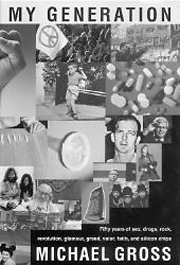YOU CAN’T FAULT Michael Gross for lacking ambition. His effort to create the quintessential biography of the baby boom generation incorporates a cast of 19 protagonists, a running history of the United States in the last six decades, and a stunning array of asides, digressions, and fascinating little facts.
My Generation
by Michael Gross (Cliff Street, $25)
But My Generation, while well written and entertaining, never manages to deliver on the author’s ambitious goal. Despite an interesting cast of characters—’60s radical Mark Rudd, millionaire developer Donald Trump, adult-film star Nina Hartley, rap music impresario Russell Simmons—Gross is too willing to simply let people tell their stories, rather than sharing his own view of why these stories are important.
One key problem is the author’s decision to further swell the ever-expanding ranks of baby boomers. Originally defined as the children of returning World War II vets, or kids born from about 1945 to 1955, the boomer generation has since been refashioned to include people born as late as 1964. In typically iconic fashion, Gross stretches even further—marking his boomer boundaries as Pearl Harbor Day (December 7, 1941) and the assassination of President John Kennedy (November 22, 1963).
This expansion admittedly helps bolster his contention that Woodstock was the defining event of the baby boom generation (otherwise, many of the festival’s performers and audience members would be pre-boomers). But 22 years’ worth is just too much baby boom. For example, using the author’s generational parameters, a 27-year-old boomer mom could have taken her 6-year-old boomer kid along to Woodstock. And even though Simmons (born in 1957) is an interesting addition to this otherwise white, middle-class cast, nobody in their right mind would describe rap music as a boomer culture phenomenon. Likewise, a child born in 1963 would become a teenager in the mid-1970s, by which time Woodstock, hippies, and kids wanting to save the world were outdated and laughable concepts. (Only a few years later, Nick Lowe would earn nods of recognition by writing a song entitled “What’s So Funny ‘Bout Peace, Love, and Understanding.”)
ADMITTEDLY, ANY BOOK about people growing older has a tendency to start hot and end lukewarm. For instance, the stories about young Tim Scully the LSD chemist are far more entertaining that those about middle-aged Tim Scully the computer geek and biofeedback enthusiast. Cynthia Bowman’s current life as a public relations executive can’t compare with her narrative about life as a San Francisco hippie and pal of the Jefferson Airplane.
Keeping track of the 19 central characters can also be a challenge for readers, especially given the mix of household names and the relatively obscure. Although Gross clearly chose his cast to allow the examination of societal trends, some of these folks just aren’t terribly reflective people. Sex star Hartley comes off as refreshingly normal, but she does not offer many deep thoughts about the growing infiltration of pornography in our culture. The only thing Trump has to say about corporate greed is that he likes it.
In praise of Gross, he’s a fine writer, the book contains fascinating information, and he deserves credit for taking on the challenge of this huge, amorphous subject. But there’s too little of the author’s own voice in his own book, and the few sections that depart from the biographical narratives (such as the final chapter) merely demonstrate an experienced writer’s cleverness. He also brings along a love for digressions that rivals political historian David Halberstam.
As a result, My Generation is fun, trivia-packed, and a great summer read that won’t strain your brain. If only it wasn’t so obvious that the author had much higher hopes.






